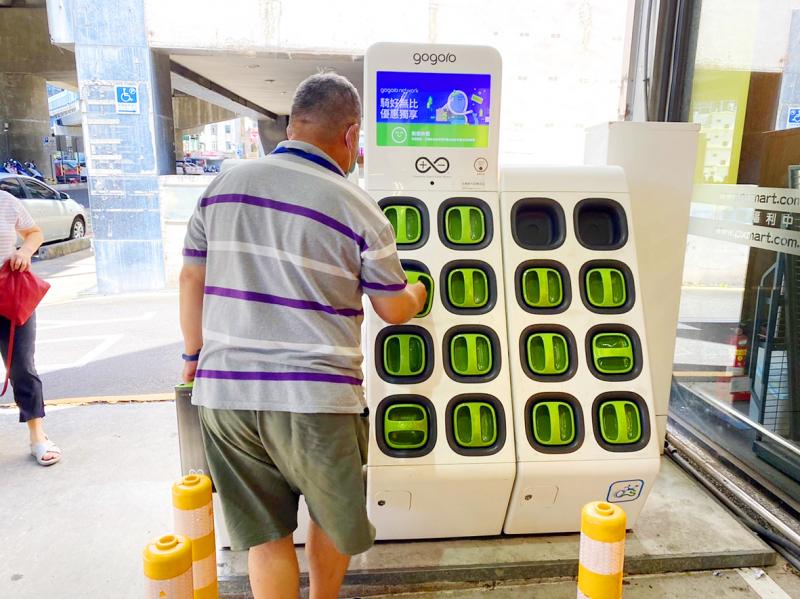Gogoro Inc (睿能創意), a leading Taiwan-based electric scooter brand, is to receive the Global Company of the Year Award from Frost & Sullivan.
Gogoro, the only Taiwanese company to have received the award, was chosen based on the California-based research and consulting firm’s analysis of the swappable battery electric scooter market.
Frost & Sullivan said it chose Gogoro because of the success of its Gogoro Network, “an intelligent energy platform that combines the power of connectivity, artificial intelligence and machine learning to create a new generation of swappable refueling that is smart, scalable and continually optimizing itself.”

Photo: Hung Mei-hsiu, Taipei Times
Under the network, the number of Gogoro’s battery swap stations, called GoStations, has grown from 70 in 2015 to almost 2,000 this year, with nearly 360,000 customers using the stations every month, Frost & Sullivan said.
“Gogoro strategically places these stations every 500 meters in places such as malls, convenience stores, parking structures and coffee shops. It has established consumer battery swapping on a mass scale, performing 265,000 battery swaps each day (135 million to date),” Frost & Sullivan said in a statement. “It demonstrates that its business model is viable and practical.”
Gogoro is set to launch similar services in cities outside of Taiwan, Frost & Sullivan research director Vishwas Shankar said.
“As a testament to its success with GoStations, its vehicles and the overall Gogoro Network, the company’s ridership developed their own community, forming multiple forums and networks and becoming ambassadors for climate change and clean energy transportation,” Shankar said.
The model is so successful that China Motor Corp (中華汽車), an automaker which sells electric scooters under the brand eMoving, announced last month that it has joined the Powered By Gogoro Network.
China Motor, which is part of the auto conglomerate Yulon Group (裕隆集團), is the latest company to join the alliance, making eMoving Gogoro’s fifth partner, following Yamaha Motor Co, Aeon Motor Co (宏佳騰), Motive Power Industry Co’s (摩特動力) PGO and Suzuki Motor Corp’s eReady.

Semiconductor business between Taiwan and the US is a “win-win” model for both sides given the high level of complementarity, the government said yesterday responding to tariff threats from US President Donald Trump. Home to the world’s largest contract chipmaker, Taiwan Semiconductor Manufacturing Co (TSMC, 台積電), Taiwan is a key link in the global technology supply chain for companies such as Apple Inc and Nvidia Corp. Trump said on Monday he plans to impose tariffs on imported chips, pharmaceuticals and steel in an effort to get the producers to make them in the US. “Taiwan and the US semiconductor and other technology industries

A start-up in Mexico is trying to help get a handle on one coastal city’s plastic waste problem by converting it into gasoline, diesel and other fuels. With less than 10 percent of the world’s plastics being recycled, Petgas’ idea is that rather than letting discarded plastic become waste, it can become productive again as fuel. Petgas developed a machine in the port city of Boca del Rio that uses pyrolysis, a thermodynamic process that heats plastics in the absence of oxygen, breaking it down to produce gasoline, diesel, kerosene, paraffin and coke. Petgas chief technology officer Carlos Parraguirre Diaz said that in

CHIP WAR: Tariffs on Taiwanese chips would prompt companies to move their factories, but not necessarily to the US, unleashing a ‘global cross-sector tariff war’ US President Donald Trump would “shoot himself in the foot” if he follows through on his recent pledge to impose higher tariffs on Taiwanese and other foreign semiconductors entering the US, analysts said. Trump’s plans to raise tariffs on chips manufactured in Taiwan to as high as 100 percent would backfire, macroeconomist Henry Wu (吳嘉隆) said. He would “shoot himself in the foot,” Wu said on Saturday, as such economic measures would lead Taiwanese chip suppliers to pass on additional costs to their US clients and consumers, and ultimately cause another wave of inflation. Trump has claimed that Taiwan took up to

SUBSIDIES: The nominee for commerce secretary indicated the Trump administration wants to put its stamp on the plan, but not unravel it entirely US President Donald Trump’s pick to lead the agency in charge of a US$52 billion semiconductor subsidy program declined to give it unqualified support, raising questions about the disbursement of funds to companies like Intel Corp and Taiwan Semiconductor Manufacturing Co (台積電). “I can’t say that I can honor something I haven’t read,” Howard Lutnick, Trump’s nominee for commerce secretary, said of the binding CHIPS and Science Act awards in a confirmation hearing on Wednesday. “To the extent monies have been disbursed, I would commit to rigorously enforcing documents that have been signed by those companies to make sure we get